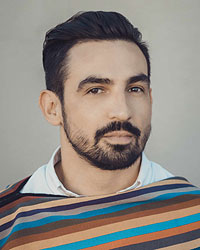Connect
A Gay Mexican Immigrant’s Journey from Novelist to Series Creator
WGAW member and Selena: The Series creator/co-showrunner Moisés Zamora shares his story about finding a community with Latinx and LGBTQ+ writers and why inclusion should be a priority in the industry.
By Moisés Zamora

Photo: Dima Otvertchenko
Here are the facts. I didn’t break into the business on my own. As a gay Mexican immigrant, the odds were not in my favor.
My first literary achievement came early on in my twenties, when my Spanish-language coming-of-age novel won a literary prize in Mexico and Spain. But the world wasn’t ready for a Mexican-American Jean Genet—the lucrative publishing deals didn’t come through. So I got a translation and proofreading job at an advertising agency. When I reached the peak of my advertising career, I was the Don Draper of junk mail. Sure, I was making six figures, but I wasn’t a writer. So, I decided to change careers and pursue screenwriting.
I went back to school, signed up for workshops, attended panels, and networked. Lee Jessup, a career coach for screenwriters, declared in a class that it takes between two and twelve years for a writer to break into the business if they’re constantly putting in the work. I didn’t hear twelve years; I heard it was possible. I set my ego aside to learn the medium’s format and work diligently on my craft. With the help and advocacy of others—mostly Black, Latinx, and queer professionals—I got my first staff-writing gigs.
But I still felt alone in my journey. An article published at the time on the Huffington Post, “The Epidemic of Gay Loneliness,” confirmed what I’d experienced as a gay Brown man—racism and rejection from the gay community—but it also pointed to several studies concluding that gay men of color are at a higher risk of depression, addiction, and suicide. Having been sober for five years at the time, I feared for my well-being.
Then, during a Latinx Writers Committee Showrunner Meet & Greet, I was paired with two gay Latino writers. We acknowledged the level of emotional energy it takes every time we tell our personal story, as it requires accessing different levels of trauma. And at the event’s reception, a group of eight of us writers were passionately exchanging stories about the industry, and, most importantly, we recognized that even though we were gay and Latinx, our personal stories were unique and diverse. It was clear we didn’t have to compete with each other for the only seat at the table. For the first time, I felt a sense of belonging and community I hadn’t encountered in gay culture. I needed authentic friendships with other gay men to thrive in the entertainment industry; I needed these men to survive.
I organized a meeting at my apartment with the intention of forming a writers’ group that focused on fellowship and professional excellence. I proposed two basic rules: be your very best and love one another. The Clubhouse—what we call the group—now has 25 members at different professional levels from various racial and ethnic backgrounds and gender identities. The friendships I’ve developed through the group have provided strength and confidence as my career has unfolded. I no longer am alone in this. Rejection doesn’t feel as personal. We have each other.
When I was asked to repeat as a staff writer a third time for a show, I declined the offer, a financial risk I could barely afford. I also changed strategies. I sought after and acquired I.P., which changed the way I was perceived. Now I was creating my own opportunities. Soon after, I was attached to develop Selena: The Series, which eventually sold to Netflix. With the potential opportunity to co-showrun, I asked the WGAW for help. I participated in the Guild’s Showrunner Training Program, where I learned that showrunning isn’t just a creative role but requires a great deal of people management. I tapped into the skills I’d developed as the head of the deadline-driven junk mail team. If I didn’t have the experience, I’d find someone who did.
I quickly became aware of my privilege and responsibility as the creator and co-showrunner of the series, particularly in terms of establishing an inclusive and nurturing environment. We set the tone. The Selena writers were Latinx of various racial identities, mostly women, and over a third were queer-identifying. Four women writers got staffed for the first time. I’m proud of the level of Latinx representation in the show. And I’m committed to making inclusion a priority.
During this transformative period of social reckoning, the industry has an opportunity to correct its injustices through action. Hire writers of color. Hire Black creators. Hire women. Hire queer-identifying and trans voices. We have much to gain by doing so, not least the vital expansion of our understanding of the human story.
Moises Zamora is a member of the WGAW Latinx Writers Committee and LGBTQ+ Writers Committee.
